We evaluated 13 pulse oximeter models and after a careful review identified 5 of the best pulse oximeters to buy in 2024. We rated the pulse oximeters on accuracy, display options, functionality, battery life, warranty and whether they meet FDA and CE standards.
Top Pulse Oximeter Tips:
- Look for a pulse oximeter with an accuracy of +/- 2%
- Make sure your pulse oximeter meets FDA and CE standards for such devices
- Measure the end of your finger before purchasing a pulse oximeter online. A proper fit means accurate readings.
What is Pulse Oximetry?
Pulse oximetry is a test measuring the oxygen level (oxygen saturation) of the blood. A pulse oximeter device is non-invasive, clipping on your finger, toe or earlobe. Two types of LED lights measure the amount of oxygen found in your blood since light absorption in oxygenated and deoxygenated blood in capillaries is different. This measures how efficiently oxygen is being carried throughout the body and oxygenating the tissue.
Those who use portable oxygen concentrators or receive in-home oxygen therapy often use a pulse oximeter to measure the oxygen levels in their blood.
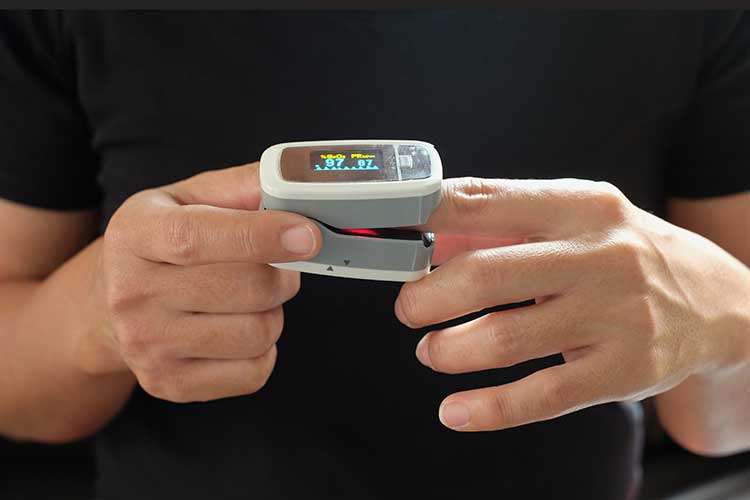 Source: Getty
Source: Getty
How to Use a Pulse Oximeter
SpO2 readings show your blood oxygen saturation
Using a pulse oximeter is fast, easy and painless. Simply attach the probe to your finger and wait until your SpO2 (blood oxygen saturation) and heart rate are shown on the display screen. The pulse oximeter then uses an LED light to emit two wavelengths that reflect differently depending on whether cells are oxygenated or deoxygenated. Recording your daily SpO2 reading and heart rate in a health journal can help you and your health care provider determine if your tissue is getting enough oxygen during all of your activities.
You should see an SpO2 reading between 94 and 100 percent. Consult your doctor if your reading is below 94 percent.
Pulse Oximetry Readings
Industry standard is +/-2% margin of error
Pulse oximeters typically give fast, accurate results and the industry standard gives only a 2% margin of error either way (high or low). Normally, over 89% of your red blood cells should be carrying oxygen. For most healthy people, an oxygen saturation level (Sp02) of 94% is considered normal. Anything below 92% indicates hypoxemia, which is a deficiency in oxygen reaching tissues in the body. The majority of pulse oximeters also take your pulse rate, making it easy to get both sets of results at the same time.
A weak pulse, poor circulation, movement and dark nail polish can all skew pulse oximeter readings.
Medical Conditions That Use Pulse Oximeter Monitoring
Pulse oximetry is frequently used to check the oxygen saturation levels of patients with any condition affecting their blood oxygen levels. These conditions include Anemia, Asthma, Chronic Obstructive Pulmonary Disease (COPD), heart attack patients, heart failure, lung cancer and Pneumonia. Your healthcare provider may advise you to use pulse oximetry for other medical conditions as well.
Pulse Oximeter Shopping Tips
Before you buy a pulse oximeter, consider the following factors to make sure you get the right device for your needs.
- Accuracy: Select a device with no more than a 2 percent plus or minus margin of error.
- Battery Life: How long do the batteries last? The pulse oximeters we chose have batteries that last 30 to 40 hours, which can last years.
- Display: Does the unit have an easy-to-read display in all light conditions? Look for things like back-lit displays and rotating displays.
- Alarms: Does the pulse oximeter device warn you about a low battery, when you are low on oxygen or have a low heartbeat?
- Durability: Look to see what kind of warranty comes with each pulse oximeter model. This often speaks to the durability of the device.
- Fit: Does the unit fit your finger comfortably? Most pulse oximeters come in the range of 0.5 to 3 inches. The pulse oximeter should fit snugly around your finger. If your finger bulges out, the oximeter is too small. Before ordering a pulse oximeter online, measure your finger from the tip of your nail to the bottom of the pad or first line on the end of your finger.
Our Search for the Best Pulse Oximeters
1. We looked at over 13 models of pulse oximeters.
2. We researched pulse oximeter models by looking at each one’s accuracy, warranty, display options, battery life, whether it has a pulse sensor and more. We also made sure each model meets FDA and CE standards.
3. We listed 5 pulse oximeter models for your consideration.
Pulse Oximeter Reviews
We looked at 13 of the best-rated pulse oximeter devices and compared features like accuracy, battery life, display options, warranty, price and more. We also wanted to make sure the pulse oximeters we chose met FDA and CE standards set for pulse oximeters used by doctors and other health professionals.
Zacurate Pro Series 500DL Review
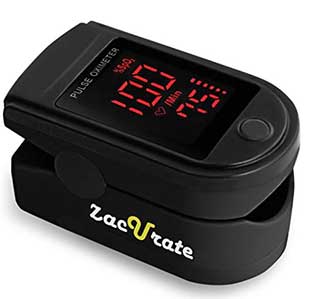
Source: Amazon
Great Price |
We selected the Zacurate Pro Series 500DL as having the best price because it comes in at under $20.00. The unit is as fast as it is affordable. Results of your SpO2 (blood oxygen saturation levels), pulse rate and pulse strength can be viewed in as little as 10 seconds and they’re conveniently displayed on a large digital LED screen.
A basic and easy-to-use model, the Zacurate Pro Series 500DL offers a low battery warning system letting you know when it’s time to change your batteries.
- Measurement Accuracy: Within 2% plus or minus
- Item Dimensions: 3.4 x 3.1 x 2 inches
- Screen type: LED, single direction
- Comes with: 2 AAA batteries, a lanyard and a silicon cover for protection
- Battery Life: 40 hours
- Warranty: 12 months
- Price: $18.95
Easy@Home Fingertip Pulse Oximeter Review
Great Reading Visualization |
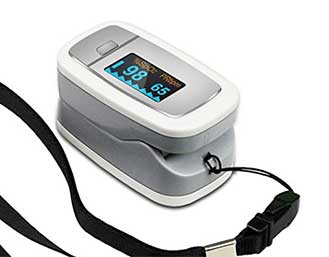
Source: Amazon
The Easy@Home Fingertip Pulse Oximeter is the only unit that gives a digital number reading as well as a waveform graph (plethysmograph) and a bar graph so you can get a visual representation of your readings. Adjustable brightness makes it easy to see results in both indoor and outdoor environments. One-touch operation makes this pulse oximeter very easy to use.
- Measurement Accuracy: Within 2% plus or minus
- Item Dimensions: 3.5 x 2.5 x 2 inches
- Screen type: Color OLED, 4-direction rotating viewing, 6 modes
- Comes with: 2 AAA batteries, a lanyard for neck or wrist, and a carrying case for protection
- Battery Life: 40 hours
- Pulse Measuring Range: 30bpm – 250bpm
- Warranty: Lifetime
- Price: $29.35
Innovo Deluxe Fingertip Pulse Oximeter Review
Advanced Software |
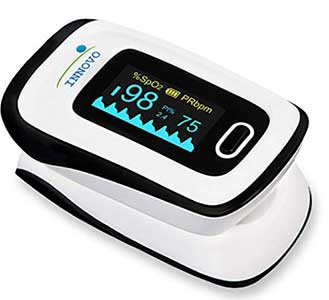
Source: Amazon
Innovo calls their Deluxe Fingertip Pulse Oximeter “one of the world’s most advanced pulse oximeters” for good reason. Not only does the Inovo Delux give you your SpO2 reading and pulse, but the Plethysmograph result also shows you your pulse oximeter is optimized and ready to give you an accurate reading. The Perfusion Index (PI) gives you the strength of your pulse. An auditory alarm can be set to warn you when your SpO2 and pulse rate is beyond the limits you have set. An auditory beep can also be set to accompany each detected pulse beat.
- Measurement Accuracy: Within 2% plus or minus
- Item Dimensions: 3.2 x 3 x 1.75 inches
- Screen type: Color OLED, 6-direction viewing
- Comes with: 2 AAA batteries and a lanyard
- Battery Life: 40 hours
- Warranty: 12 months
- Price: $26.99
Santamedical Generation 2 Fingertip Pulse Oximeter Review
Highly Rated |
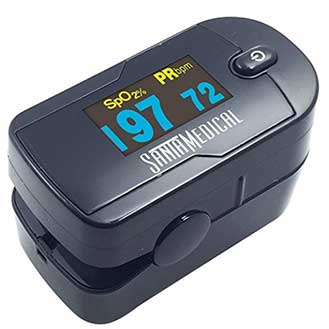
Source: Amazon
The newly updated Santamedical Generation 2 Fingertip Pulse Oximeter has the highest rating among users with nearly 90% of buyers across multiple sites rating it a 5-star product. Users frequently comment on how accurate it is and how easy it is to use on adults as well as children. Its self-adjusting finger clamp and small, portable size are favorite features as is the bright, easy-to-read display. It also features an auto shut-off 5 seconds after you remove your finger from the chamber.
- Measurement Accuracy: Within 2% plus or minus
- Item Dimensions: 3.5 x 2.5 x 2.1 inches
- Screen type: Color OLED, 4-direction viewing, 6 modes
- Comes with: 2 AAA batteries and a lanyard
- Battery Life: 30 hours
- Warranty: 12 months
- Price: $24.95
AccuMed CMS-50D Pulse Oximeter
Great for Those on the Go |
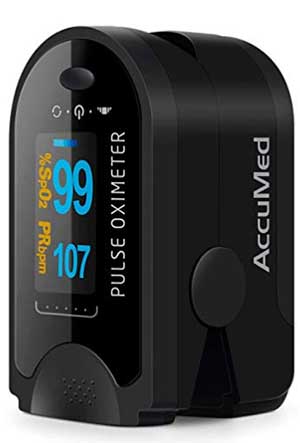
Source: Amazon
The portable and lightweight design of the AccuMed CMS-50D Pulse Oximeter makes it a great option for anyone who is constantly on the go. Weighing only 50 grams with the batteries, AccuMed includes both a silicon cover and a carrying case so you can carry your pulse oximeter in your purse, pack, luggage or pocket. The device gives you your oxygen saturation levels, pulse rate, pulse intensity and pulse strength in as little as eight seconds. After five seconds of inactivity, the auto shut off feature kicks in, prolonging your battery life. The adjustable screen brightness and auto rotation function that detects your hand movement, much like a smartphone does, make your results easy to read.
- Measurement Accuracy: Within 2% plus or minus
- Item Dimensions: 3 x 1 x 2 inches
- Screen type: Color LED with auto screen rotation
- Comes with: 2 AAA batteries, a lanyard for neck or wrist, silicon cover and a carrying case for protection
- Battery Life: 32 hours
- Warranty: 12 months
- Price: $21.95
Frequently Asked Questions about Pulse Oximeters
How accurate are pulse oximeters?
According to the American Thoracic Society, the oxygen level readings from a pulse oximeter are considered to be reasonably accurate. Most pulse oximeters on the market today give a reading of +/- 2 (2% over or 2% under) what your O2 saturation would be if the reading came from obtaining an arterial blood gas draw. The result may be less accurate if a person is wearing nail polish (particularly dark colored polish), is wearing artificial nails, has cold hands, or has poor circulation. A pulse oximeter may also be less accurate with very low oxygen saturation levels (below 80%) or if the patient has very dark skin.
Is there a way to calibrate my pulse oximeter to make sure it’s accurate?
Like any portable home health device, it’s always a good idea to take your pulse oximeter to your doctor’s appointment so you can compare your readings to the readings the medical staff get using their equipment.
Can these pulse oximeters be used overnight?
No. These pulse oximeters are all single-use items, meaning they can’t be used for continuous monitoring around the clock.
Are these pulse oximeters the same as the ones that medical professionals use?
Some nurses, respiratory therapists and doctors were verified purchasers who left reviews on several sites and the vast majority of them stated these brands are great for quick results. While no pulse oximeter will take the place of an arterial blood gas test and none should be used to diagnose your own health, these brands all have their uses in order to give you a quick snapshot of your oxygen saturation levels and/or pulse at any given moment. However, regardless of what your readings say, if you find yourself experiencing symptoms of hypoxemia, you should seek medical attention.
Should people on supplemental oxygen adjust their flow based on pulse oximeter readings?
It is always best to consult your physician before making any changes to prescribed oxygen therapy.
Concluding Thoughts on Pulse Oximeters
Bottom Line:
Pulse oximetry is a fast, noninvasive, and completely painless test that carries no risks when used correctly.
For those who need to monitor their oxygen saturation levels and pulse on the fly, these pulse oximeters, combined with regular medical care and paying attention to your own symptoms can be invaluable tools.
Best Pulse Oximeters
| Pulse Oximeter | Best For | |
|---|---|---|
| 1 | Zacurate Pro Series 500DL | Great Price |
| 2 | Innovo Deluxe Fingertip Pulse Oximeter | Advanced Software |
| 3 | Santamedical Generation 2 Fingertip Pulse Oximeter | Highly Rated |
| 4 | AccuMed CMS-50D Pulse Oximeter | Great for Those on the Go |
| 5 | Easy@Home Fingertip Pulse Oximeter | Great Reading Visualization |